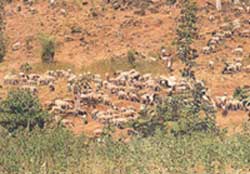More than just a fair exchange
 IN MANY agricultural ecosystems, manure is used to provide the nutrients and organic matter needed for soil fertility on cropland. Even where chemical fertilisers are available, organic matter such as that provided by manure is the key to sustainable cropping.
IN MANY agricultural ecosystems, manure is used to provide the nutrients and organic matter needed for soil fertility on cropland. Even where chemical fertilisers are available, organic matter such as that provided by manure is the key to sustainable cropping.
Farmers and pastoralists often develop relationships centred around each other's needs: the pastoralists provide the manure for farmers and in turn get fodder. Such arrangements are common in semi-arid and arid regions, where decomposition of crop residues can be extremely slow. Using livestock digestive systems to break down crop residues quickens nutrient cycling.
An excellent example of such mutualism is found between Bharwad herders and village farmers near Rajkot in Gujarat's Saurashtra region. The "nutrient and energy trade" between these farmers and pastoralists not only underlies agricultural sustainability, but may actually be increasing in importance because of the loss of common grazing lands and the increasing demands for fertiliser.
The Bharwad households generally keep livestock of sheep and goats. About 90 per cent of the herd is Maravadhi sheep, a native breed whose coarse wool is used to weave rugs. Income is generated from the sale of animals for meat and from sheared wool, milk and dung. Goats make up the remaining 10 per cent of the herd, producing milk for household consumption.
Herders collect a bullock cart load (about 100 kg) of dung pellets of 200 sheep and goats in about three days and trade it for a cart-load of bailed millet or wheat straw, which are low-quality animal feeds. A cart-load of straw fodder is enough to feed the 200 small ruminants for only about one day. The rest of their diet is obtained from meagre "wild" forage resources that remain on degraded village commons, crops left over after harvests, weeds or from fodder received in exchange for farm labour.
Just before farmers begin planting, herds are sometimes left out in the fields overnight to directly deposit dung and save time and labour. In return, herds are either fed plant residues or the herders are paid cash.
The manure trade is already a viable village-level component of sustainable agricultural productivity. And, with the increasing awareness of the importance of organic fertilisers, the role of pastoralists will attain even more prominence.
